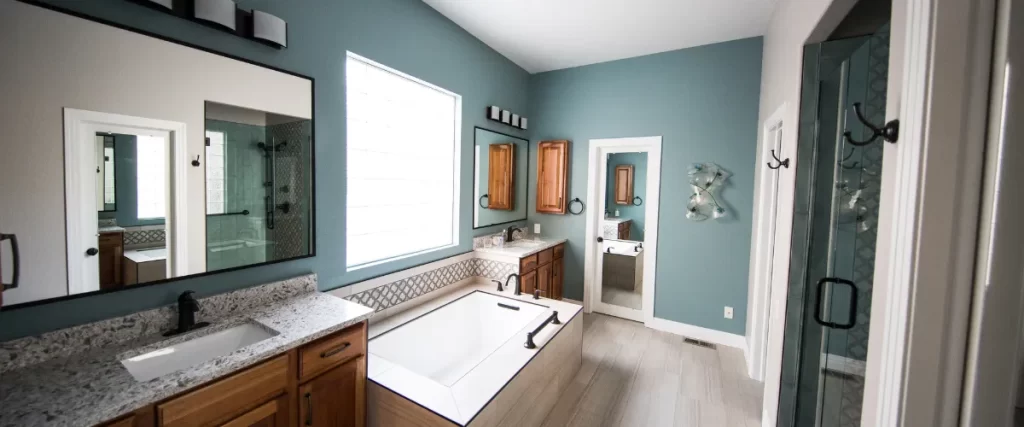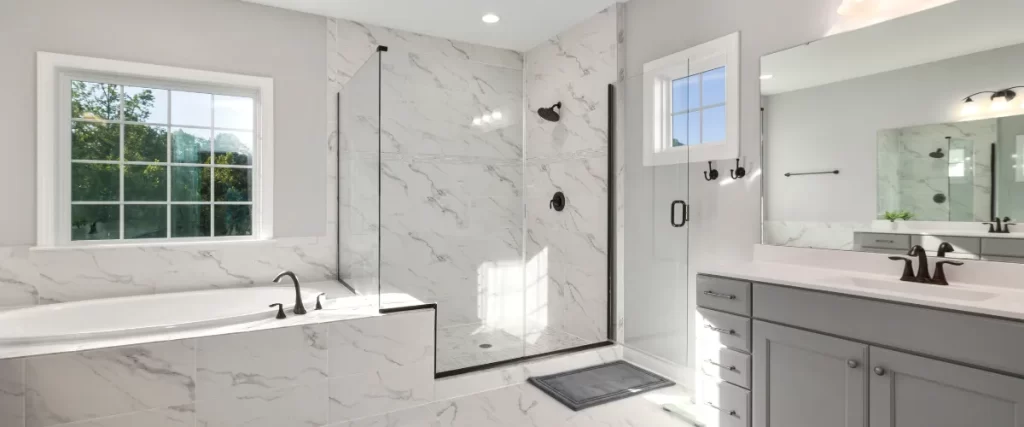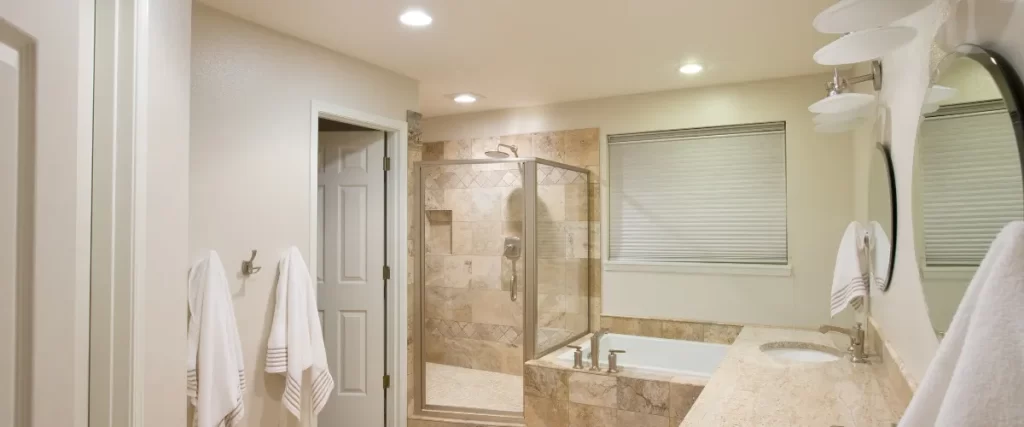Living in Papillion means you’re no stranger to hard water. With water hardness levels in many parts of Nebraska reaching above 10 grains per gallon, homeowners often struggle with the effects of minerals like calcium and magnesium on their plumbing and bathroom surfaces.
These minerals can leave behind unsightly stains, scale buildup, and even damage your fixtures over time. So, when it’s time for a bathroom remodel, it’s important to choose the right materials that can withstand the challenges of hard water while still maintaining style and function.
In this guide, we’ll walk you through the best materials for bathroom remodeling in Papillion that will help you battle the effects of hard water. Whether you’re upgrading your shower, sink, or countertops, these recommendations will ensure your bathroom remains both beautiful and functional for years to come.

Why Hard Water is a Concern for Bathroom Remodels
Hard water contains high levels of minerals, which can cause a variety of problems in your bathroom. The most noticeable effect is the buildup of scale on your faucets, showerheads, and tiles. Over time, this buildup can make your fixtures look dingy and reduce their efficiency.
It can also lead to stubborn water spots on glass shower doors, staining of sinks and bathtubs, and corrosion of metal plumbing components.
The key to preventing these issues is selecting materials that are resistant to the harsh effects of hard water. While you can always install water softeners or use special cleaning agents, the materials you choose during a bathroom remodel play a crucial role in minimizing damage.
Best Materials for Bathroom Fixtures in Hard Water Areas
When remodeling your bathroom, you’ll want to choose materials that are durable, easy to clean, and resistant to scale buildup. Here are the best materials to consider for various bathroom components:
1. Ceramic or Porcelain Tiles for Shower Walls
Ceramic and porcelain tiles are excellent options for bathroom walls, especially in showers, because they are non-porous. This means they won’t absorb water and minerals, which helps prevent staining and scale buildup from hard water.
Additionally, ceramic and porcelain tiles are easy to clean with just regular cleaning agents, making them a low-maintenance choice for homeowners dealing with hard water.
Why it works for hard water: Ceramic and porcelain tiles are resistant to stains, corrosion, and mineral buildup. They don’t absorb water, which makes them durable in high-moisture environments.
2. Glass Shower Doors with Nano Coating
Glass shower doors are a popular choice for modern bathrooms, but they can quickly become covered in water spots and mineral deposits from hard water. The solution? Choose glass doors with a nano-coating or hydrophobic treatment.
This coating creates a barrier on the glass, making it much harder for water droplets to stick. It also reduces the buildup of soap scum and hard water stains.
Why it works for hard water: Nano coatings prevent water spots and stains by repelling water and making it easier to clean the glass after each use.
3. Stainless Steel Fixtures
When it comes to faucets, showerheads, and other bathroom fixtures, stainless steel is one of the best materials to choose for homes with hard water. Stainless steel resists rust, corrosion, and mineral buildup, making it a durable and low-maintenance option.
Unlike chrome or brass fixtures, which can develop a cloudy or stained appearance due to hard water, stainless steel stays clean and shiny.
Why it works for hard water: Stainless steel is highly resistant to rust and corrosion, and its smooth surface makes it harder for minerals to cling to, keeping your fixtures looking like new.

4. Quartz Countertops for Durability
When choosing countertops for your bathroom remodel, quartz is a fantastic choice for homes with hard water. Quartz countertops are engineered from a mix of natural stone and resin, which makes them non-porous and highly resistant to stains and mineral deposits.
They don’t absorb moisture, so they won’t harbor the minerals that cause hard water damage. Additionally, quartz is incredibly durable and easy to maintain, requiring little more than regular cleaning.
Why it works for hard water: Quartz countertops are non-porous and resistant to water damage, making them an excellent option for bathrooms that experience frequent exposure to hard water.
5. Acrylic or Fiberglass Bathtubs
When selecting a bathtub, acrylic and fiberglass are two of the best materials for homes with hard water. Both materials are resistant to hard water stains, and they are easier to clean than traditional porcelain bathtubs. While porcelain tubs are prone to staining from hard water, acrylic and fiberglass tubs feature a smooth surface that is more resistant to mineral buildup.
Why it works for hard water: Acrylic and fiberglass are non-porous materials that resist staining and can be cleaned with gentle cleaning agents, unlike porcelain tubs that may absorb minerals and show wear over time.
How to Protect Your Bathroom Materials from Hard Water Damage
While choosing the right materials is crucial, it’s also important to adopt a proactive approach to protecting your bathroom from hard water damage. Here are a few strategies to keep your bathroom in top shape:
1. Install a Water Softener
A water softener can reduce the hardness of your water by removing calcium and magnesium, the two main culprits behind hard water damage. With a water softener, you’ll protect your bathroom fixtures from the onset of scale buildup and mineral stains.
2. Regular Cleaning
Even with the right materials, regular cleaning is essential to prevent hard water stains from accumulating. Use non-abrasive cleaners that are specifically designed to tackle hard water buildup. A squeegee after each shower can also go a long way in preventing water spots on your glass shower doors.
3. Use a Showerhead Filter
In addition to installing a water softener, you can also add a showerhead filter. These filters remove some of the minerals that cause hard water issues directly at the source, further reducing the chances of buildup on your shower walls and fixtures.
Frequently Asked Questions (FAQ)
How does hard water affect my bathroom fixtures?
Hard water can cause mineral buildup and staining on your bathroom fixtures, such as faucets, showerheads, tiles, and sinks. Over time, it can corrode plumbing and create a cloudy or dull appearance.
What’s the best way to prevent hard water stains on my bathroom tiles?
Using ceramic or porcelain tiles is one of the best ways to prevent stains from hard water. Additionally, applying a protective sealant can help reduce staining and make cleaning easier.
Can I remove existing hard water stains from my bathroom?
Yes! You can use a mixture of vinegar and water or a store-bought cleaner designed for hard water stains. For more stubborn stains, a gentle scrubbing brush may be needed.
Should I get a water softener for my bathroom remodel?
If you experience significant hard water problems in your home, a water softener can be a worthwhile investment to protect your bathroom and other fixtures from mineral damage.

Conclusion
Bathroom remodeling in Papillion, especially in homes affected by hard water, requires careful thought and consideration. By selecting the right materials, such as ceramic or porcelain tiles, stainless steel fixtures, quartz countertops, and fiberglass tubs, you can minimize the impact of hard water while creating a beautiful and durable bathroom.
If you’re ready to start your bathroom remodel, contact us at (402) 661-0910. Our experts are here to help you create the bathroom of your dreams—one that can handle the challenges of hard water while remaining stylish and functional.
